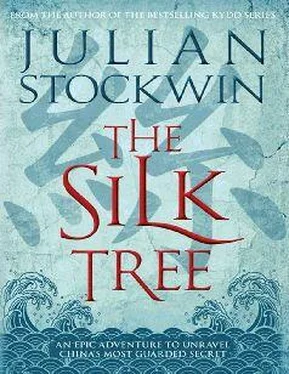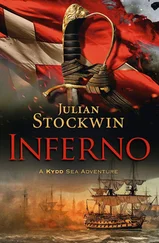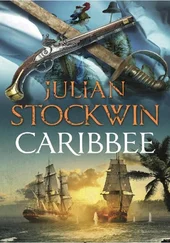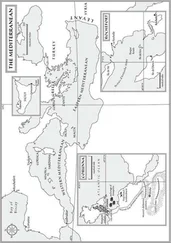Narses added, ‘Then I will call for you in two hours and together we will attend at the Magnaura Great Hall for the grand reception, after which we will have our audience.’
After he had gone, Marius turned to Nicander. ‘Be buggered to it, Nico, but I don’t mind telling you I’m… I’m bloody troubled…’
Narses was wearing his full ceremonials: a richly embroidered dalmatica with the tablion of high rank, an infinity of precious stones sewn to his robes, shoes and headgear.
The Imperial Palace was not a single building but a bewildering series of massive marble edifices. The three made their way through a great courtyard faced by other grand structures. They joined others progressing past the great bronze gate to the white colonnades which led to a domed red-stone hall.
Entering by the smaller of three doorways they found themselves in a hushed throng in a great vaulted space. At the far end in the raised apse was a grand throne, illuminated by light from lofty windows.
Leaving the holy men in a corner with strict instructions to remain there and speak with no one, Narses moved off to greet the dignitaries.
Nicander and Marius took in the spectacle of hundreds of nobles, ministers, generals and grand officials of state, waited upon by white-robed servitors and flanked on all sides by soldiers in gleaming plate armour.
Toward the centre of the assembly were the barbarian kings from the shadowy wilds north of the frontier – Gepids, Avars, Uighurs, others. Here to be wooed and impressed by the sights and sensations of civilisation.
The hum of conversation died at a new sound: from far away the ethereal purity of a choir floated on the air. It strengthened: after each stanza the melodious clash of cymbal, then the voices again – both deep and rich, pure and high in a delivery that lifted the soul.
The head of a procession entered the hall. A great golden ornamented cross was borne in front, behind it thuribles swung, the rich odour of incense wreathing the air. Then two holy icons carried high and crowned with myrtle, and another cross.
The choir, dressed in simple vestments and carrying lighted tapers followed, eyes raised to heaven in sonorous chant. It processed into the centre of the gathering and then moved towards the throne, dividing each side and ascending the stalls in the apse behind it. Then all was silent.
With a blast of sound at the doorway from the braying of bronze trumpets the Emperor stepped into view in a blaze of splendour – a heavily jewelled purple pallium cloak over gold breastplate fastened with a brooch of four immense pendant pearls, a red and gold diadem of heart-stopping magnificence. The ruler of the world!
Justinian moved with stately deliberation, followed by a host of nobles. Nicander was transfixed as the glittering image passed across his vision.
A murmur spread, growing in strength: ‘Divine Caesar! Ever august! Victorious and triumphant! Emperor of the Romans! All hail to thee!’
The progress moved on, followed by every eye.
The great ornamented cross was set down and Justinian knelt before it in prayer. He rose and kissed it then ascended the throne.
A richly dressed officer of state strode forward, the feared Master of Offices, Peter the Patrician. From a parchment scroll he declaimed in ringing tones. Nicander could not make out the words but in a heady breathlessness he watched the proceedings unfold.
One by one the barbarian kings were brought before Justinian where they rendered obeisance and in return were blessed and awarded gifts. At certain points the choir made intercession. It was a masterful display – the sounds of angels ringing out, the wafting incense, splendour and brilliance.
Then it was over.
The procession formed up; this time at the head, following the cross, Justinian. With all the pomp and glory of the throne of Byzantium, it proceeded out of the Magnaura Great Hall, passing close to Nicander.
A wave of stark terror overcame him – how could he continue with his plan, stand before that vision and present a business proposition that was entirely false?
As the procession receded, he reached for control: in minutes he was going face to face with the Emperor. He had to go through with it or…
As if in answer, a strange feeling of calmness stole over him; one of ringing destiny.
Narses came for them. ‘His Sacred Majesty disrobes. We will await him at the Daphne Palace.’
Nicander stepped forward but Marius hung back.
‘I can’t do it!’ he muttered hoarsely. ‘What if he speaks to me? Wha-what do I say?’
‘Come on, Marius. I’ll be doing the talking.’
‘He’ll have a go at me – and then I’ll… I’ll say a wrong thing!’
‘Not if you’ve taken a vow of silence and cannot speak.’
They swept on; past the Delphax with its noble columns, the domed Onopodion, the low colonnaded Consisterium, more. A concentration of grandeur and solemnity.
Finally they emerged opposite the Daphne Palace. The actual residence of the Emperor, it was faced with columns but there were no windows or doors to be seen except for the main entrance. There, wreathed smoky-white marble columns supported a facade of the utmost elegance, the approach steps a contrasting dusky red stone.
They rounded the end of the building to a lowly entrance and passed inside a single plain doorway which led into a room beyond.
Narses held up his hand.
They heard movement in the room; the scraping of a chair, the chink of a goblet and a slight cough.
Narses gave them a warning glance, then knocked and disappeared inside. There was a murmur of voices and he emerged. ‘His Divine Majesty wishes you to enter upon his presence.’
Keyed to the highest possible level, Nicander told himself this was really only a bigger league sales pitch, much like the time when, single-handed, he landed that Epirus deal in front of the Exarch of Achaea himself, or that masterly performance when…
With a single backward glance at the stricken Marius he stepped forward. To stand before Justinian, Emperor and Caesar of the Roman Empire, its people and dominions.
Sitting at a desk that was not much more than a bench he looked up.
Nicander saw before him a man of years, an abstemious and heavy face, brooding and unsmiling. Bare-headed, he wore a plain rust-coloured chlamys secured with a simple gold clasp which, with a single massive ring, was the only ornamentation.
‘Approach!’
Heart in his mouth Nicander went to him, knelt and kissed a worn slipper, remembering at the last minute to stay on one knee.
‘Rise!’
Pulse racing, he raised his eyes to meet those of the ruler of civilisation.
‘From where do you hail, good Brother?’ The tone was benign, encouraging.
‘Sire, I am Brother Paul and this, Brother Matthew. Our home is the kingdom of Artaxium Felix, which is in the desert, past the mountains of Hawazin and beyond the land of the Carnaites.’
‘You’re a Lakhmid?’
‘No, Majesty,’ Nicander replied, not sure what that meant. ‘We are an ancient race, much decayed in fortune since our river changed its course. We’ve been cut off by the advancing desert and have lived alone, away from the outer world for centuries.’
‘Are you then a pagan? Your Latin does you credit, I ask this only to establish your standing before God.’
‘Why no, sir! Our little kingdom was established in the time of your illustrious predecessor, Alexander Severus, at the time of the first Persian wars. We were loyal to Rome but the last we have of the true way was the Christianity of the blessed Constantine. From that time we have been alone.’
‘So you’re then untainted by the ungodly heresies of Arianism, the Monophysites or even, our good Lord forbid, the Nestorians?’
Читать дальше










